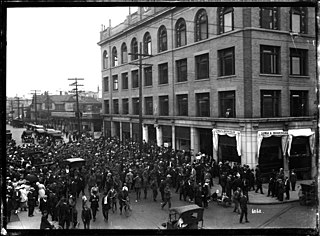Related Research Articles

Workers' compensation or workers' comp is a form of insurance providing wage replacement and medical benefits to employees injured in the course of employment in exchange for mandatory relinquishment of the employee's right to sue his or her employer for the tort of negligence. The trade-off between assured, limited coverage and lack of recourse outside the worker compensation system is known as "the compensation bargain.” One of the problems that the compensation bargain solved is the problem of employers becoming insolvent as a result of high damage awards. The system of collective liability was created to prevent that and thus to ensure security of compensation to the workers.

Elizabeth Witmer is a former Deputy Premier of Ontario, Canada. She was a member of the Legislative Assembly of Ontario from 1990 until 2012, representing Waterloo North and later Kitchener—Waterloo as a member of the Progressive Conservative Party.
Becky Barrett is a retired politician in Manitoba, Canada. She was a member of the Legislative Assembly of Manitoba from 1990 to 2003, and was a cabinet minister in the New Democratic Party (NDP) government of Gary Doer from 1999 to 2003.
Tony Silipo was a Canadian politician. He served in the Legislative Assembly of Ontario from 1990 to 1999 representing the New Democratic Party in the downtown Toronto riding of Dovercourt. In 1999 he was appointed to the Workplace Safety and Insurance appeals tribunal. He died in 2012 from a brain cancer.

The Ontario Public Service Employees Union is a trade union representing public sector employees in the province of Ontario, Canada. It claims a membership of approximately 180,000 members. OPSEU was established in 1975 as the successor union to the former Civil Service Association of Ontario, which was founded in 1911. In 1979, OPSEU affiliated with the Canadian Labour Congress, the National Union of Public and General Employees, and the Ontario Federation of Labour. OPSEU is affiliated to several labour councils across Ontario.

The Workplace Safety and Insurance Board (WSIB) is the workplace compensation board for provincially regulated workplaces in Ontario. As an agency of the Ontario government, the WSIB operates "at arm's length" from the Ministry of Labour, Training and Skills Development and is solely funded by employer premiums, administration fees, and investment revenue. The WSIB is one of the largest compensation boards in North America and is primarily responsible for administering and enforcing the Ontario Workplace Safety and Insurance Act (WSIA).
WSIB may refer to:
The Ontario Labour Relations Board is an adjudicative agency of the Ministry of Labour, Training and Skills Development and was established by the Ontario government in 1948. It defines itself as "an independent, quasi-judicial tribunal mandated to mediate and adjudicate a variety of employment and labour relations-related matters under a number of Ontario statutes". Its current (2022) chair is Brian O'Byrne.

Labor relations is a field of study that can have different meanings depending on the context in which it is used. In an international context, it is a subfield of labor history that studies the human relations with regard to work in its broadest sense and how this connects to questions of social inequality. It explicitly encompasses unregulated, historical, and non-Western forms of labor. Here, labor relations define "for or with whom one works and under what rules. These rules determine the type of work, type and amount of remuneration, working hours, degrees of physical and psychological strain, as well as the degree of freedom and autonomy associated with the work." More specifically in a North American and strictly modern context, labor relations is the study and practice of managing unionized employment situations. In academia, labor relations is frequently a sub-area within industrial relations, though scholars from many disciplines including economics, sociology, history, law, and political science also study labor unions and labor movements. In practice, labor relations is frequently a subarea within human resource management. Courses in labor relations typically cover labor history, labor law, union organizing, bargaining, contract administration, and important contemporary topics.
The Workers Compensation Board of Manitoba (WCB) is an agency of the Government of Manitoba that provides a system for workplace injury and disability insurance for workers and employers of Manitoba, paid for by employers.
The Ohio Bureau of Workers' Compensation provides medical and compensation benefits for work-related injuries, diseases and deaths. It was founded in 1912. With assets under management of more than $29 billion, it is the largest state-operated and second largest overall provider of workers’ compensation insurance in the United States.
Advocates for Injured Workers (AIW) is a student legal clinic operating in Toronto and affiliated with the University of Toronto Faculty of Law. This clinic is supervised by the Industrial Accident Victims' Group of Ontario (IAVGO) - itself a community legal clinic funded by Legal Aid Ontario.
The WorkCover Authority of New South Wales was a New South Wales Government agency established in 1989. The agency created regulations to promote productive, healthy and safe workplaces for workers and employers in New South Wales. The agency formed part of the Safety, Return to Work and Support Division established pursuant to the Safety, Return to Work and Support Board Act, 2012 (NSW).

WorkSafe Victoria is the trading name of the Victorian WorkCover Authority, a statutory authority of the state government of Victoria, Australia.

The California Labor Code, more formally known as "the Labor Code", is a collection of civil law statutes for the State of California. The code is made up of statutes which govern the general obligations and rights of persons within the jurisdiction of the State of California. The stated goal of the Department of Industrial Relations is to promote and develop the welfare of the wage earners of California, to improve their working conditions and to advance their opportunities for profitable employment."
A grievance is a formal complaint that is raised by an employee towards an employer within the workplace. There are many reasons as to why a grievance can be raised, and also many ways to go about dealing with such a scenario. Reasons for filing a grievance in the workplace can be as a result of, but not limited to, a breach of the terms and conditions of an employment contract, raises and promotions, or lack thereof, as well as harassment and employment discrimination.
The law for workplace bullying is given below for each country in detail. Further European countries with concrete antibullying legislation are Belgium, France, and The Netherlands.

The Institute for Work & Health (IWH) is an independent, not-for-profit research organization based in Toronto, Canada. Its mission is to “promote, protect and improve the safety and health of working people by conducting actionable research that is valued by employers, workers, and policy-makers.”
The Ontario Association of Certified Home Inspectors is a not-for-profit corporation established by letters patent on March 12, 2012. It was created to provide province-specific support for Home Inspectors and consumers of their services.
References
- ↑ "About WSIAT - Contacting the Tribunal". www.wsiat.on.ca. Archived from the original on 2007-01-05.
- ↑ "OWTL | Workers' Compensation Law - A Documentary History in Ontario".
- ↑ "Law Document English View". 24 July 2014.
- ↑ "OWTL | Workers' Compensation Law - A Documentary History in Ontario".
- ↑ "Decision Summary Search". www.wsiat.on.ca. Archived from the original on 2001-04-22.
- ↑ "Ontario Workplace Safety and Insurance Appeals Tribunal - Ontario" . Retrieved 2023-09-22.
- ↑ "WSIAT | WSIAT Complaint Policy". www.wsiat.on.ca. Archived from the original on 2010-03-11.
- ↑ "WSIAT | Why is WSIAT an Expert Tribunal?". www.wsiat.on.ca. Archived from the original on 2014-04-22.
- ↑ "WSIAT | French Language Services Guidelines for Tribunal Staff". www.wsiat.on.ca. Archived from the original on 2010-03-11.
- ↑ "WSIAT | Practice Directions". www.wsiat.on.ca. Archived from the original on 2010-02-25.
- ↑ "OWTL | Ontario Workplace Tribunals Library".